CHISINAU: Torn between the EU and Moscow, ex-Soviet Moldova elected a parliament with no clear majority, results showed Monday, potentially throwing the impoverished country into political turmoil.
The inconclusive result will make coalition talks difficult and could lead to protests or even another election within weeks.
After a chaotic weekend vote marked by accusations of fraud, the pro-Russian Socialist Party won the largest share of the vote, taking over 31%.
But under a new electoral system that divides the 101-seat parliament into seats elected by party lists and individual constituencies, Moldova’s ruling Democratic party won the most seats.
Led by powerful oligarch Vlad Plahotniuc, the Democratic party won 23.9% of the vote but took 34 seats, three more than the socialists.
The pro-European ACUM alliance, which wants Moldova to seek closer ties with the European Union, came second with 26%. It took 23 seats.
A party led by a businessman convicted of billion-dollar fraud, Ilan Shor, won 8.46% of the vote — taking eight seats in parliament.
Opposition promises protests
Only Plahotniuc’s Democratic Party has said it is ready to enter coalition talks.
President Igor Dodon’s Socialists and the pro-European opposition have ruled out working with other parties.
On Sunday, pro-Brussels alliance leader Andrei Nastase said his party will only enter a coalition “with the people of Moldova” and that his supporters were “ready to defend their rights on the street”.
Both Dodon and Nastase accused the ruling Democrats of massive election fraud that involved bringing in people from Moldova’s breakaway region of Transnistria and telling them how to vote.
Nastase alleged that “they (the ruling party) are bussing in vulnerable people ripe for corruption.”
The Democratic Party in turn said the socialists offered bribes to residents of Transnistria to back their candidates.
The election campaign was chaotic, with ACUM leaders at one point claiming they were poisoned and Russian authorities accusing Plahotniuc of running a vast money-laundering scheme in 2013-2014.
Foreign election observers were to give a briefing later Monday on the conduct of the election, potentially giving critics ammunition to claim the vote was undemocratic.
Between Moscow and the EU
The vote reflected the deep divisions that for years affected the former Soviet republic nestled between Ukraine and Romania.
While many among the 3.5 million population want to maintain close ties with Moscow, others seek to follow the example of Romania — with which Moldova shares a language and long history — and look west to the EU.
The Democratic Party has sought a balanced approach between Moscow and Brussels.
But relations with the EU have deteriorated. Last November, the EU reduced aid to Chisinau citing a “deterioration of the rule of law” — a reference mainly to the struggle against corruption.
Russia, meanwhile, has rallied around Dodon — a close ally of President Vladimir Putin.
As well as seeking to keep Chisinau in its sphere of influence, Moscow has long backed separatists in Transnistria — a region that broke away from Moldova after the fall of the USSR.
Moldova has struggled to find its place since gaining independence with the 1991 collapse of the Soviet Union.
The economy is propped up by remittances from workers abroad, which has caused the working-age population to fall sharply.
Moldova last year ranked 117 out of 180 nations in Transparency International’s Corruption Perceptions Index. — AFP













